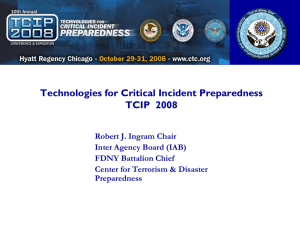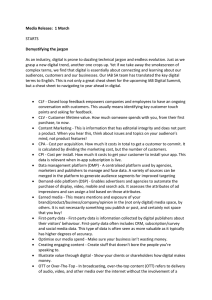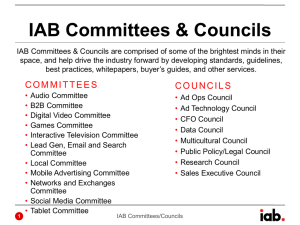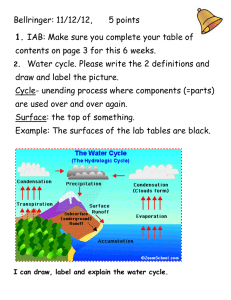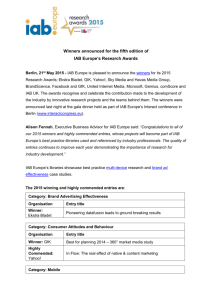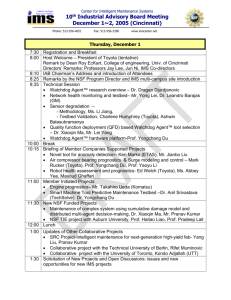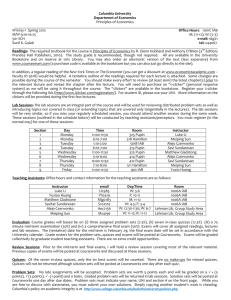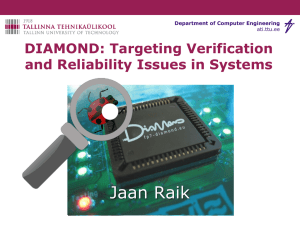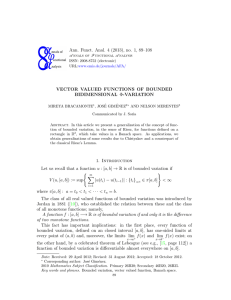IAB Presentation_MAR 2015
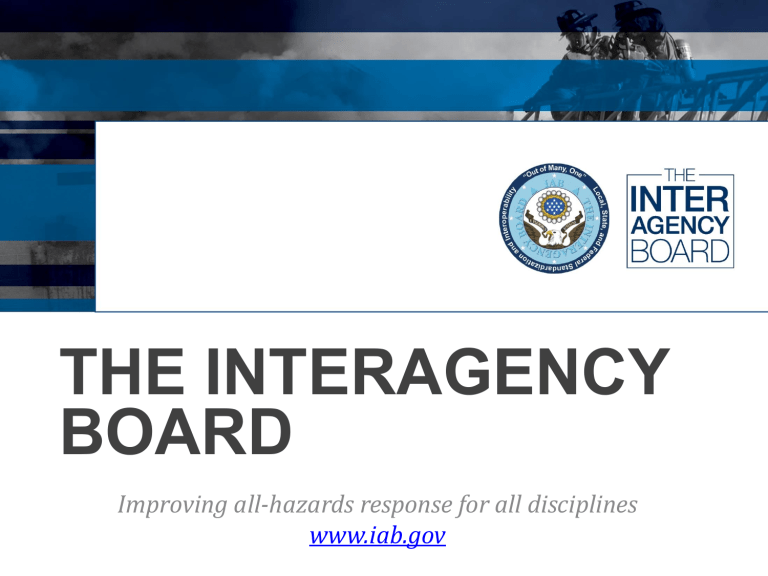
THE INTERAGENCY
BOARD
Improving all-hazards response for all disciplines www.iab.gov
What is the IAB?
• Multi-disciplinary volunteer working group of emergency preparedness and response practitioners.
• Trusted, authoritative, representative, and valid repository of operational knowledge, technical expertise, and “feet on the street” field perspective.
• A unified voice for the responder community.
Where did it come from?
• Sanctioned in 1998 by the US Attorney General as a resource for federal, state and local levels of government.
• Founded by DoD and the DOJ FBI WMD Countermeasures
Unit.
• Evolved from WMD focus to all-hazards incident response, with a continuing special emphasis on CBRNE issues.
IAB Mission
“To strengthen the nation’s ability to prepare for and respond safely and effectively to emergencies, disasters, and CBRNE incidents.
The IAB will accomplish this by:
• Emphasizing interoperability, compatibility, and standardization
• Fostering a multi-disciplinary perspective
• Facilitating effective intergovernmental partnerships
• Being a credible voice of the responder community
• Being proactive
• Sharing field operational experiences and practices”
Membership
• 125+ Members, 60+ Subject Matter Experts
• Representing:
– 30 States
– Local, State, and Federal agencies
– Federal research facilities, responder associations, and standards development organizations
• Disciplines and Expertise include:
– Fire Service, Law Enforcement, Medical/Health, Emergency
Management, Military, Emergency Communications, Agriculture,
Public Works
Demographics: Responder Disciplines
*Other includes: Incident Management and Veterinary
Source: 2013 IAB Demographics Survey
Demographics: Areas of Expertise
*Others include: Communications, Search & Rescue, Tactical Operations, Structural Collapse Rescue, Confined Space
Rescue, Pre-hospital Emergency Medical Care, Criminal Investigations, Clandestine Laboratory Response, Nuclear
Materials, Public Health, and Force Protection
Source: 2013 IAB Demographics Survey
Committees & SubGroups
• Chair and 2 Deputy Chairs are state/local representatives
• Each SubGroup co-chaired by a federal and a state/local representative
The Federal Agency Coordinating
Committee (FACC)
• Interface between the IAB and the sponsoring federal government agencies.
• Coordinates the interests and initiatives of the federal and first responder communities.
• Provides funding support for the IAB to operate.
FACC Members
• DoD
– JPEO for Chemical and Biological Defense
– JPEO for Chemical and Biological Defense, Joint Project Manager Guardian
– Homeland Defense and Americas’ Security Affairs
• DHS
– FEMA, CBRNE Office
– FEMA, Grant Programs Directorate
– FEMA, National Preparedness Directorate
– National Programs and Protection Directorate, Office of Infrastructure Protection
– Office of Health Affairs, BioWatch
– S&T Directorate, Acquisition Support and Operations Analysis Group, Office of Standards
– S&T, Support to the Homeland Security Enterprise and First Responders Group
• DOJ, Office of Justice Programs, National Institute of Justice
• NIOSH, National Personal Protective Technology Laboratory
The Standardized Equipment List (SEL)
• A generic, minimum list of equipment and supplies recommended by the IAB to local, tribal, state, and federal government organizations preparing for and responding to major all-hazards incidents
• Available on interactive CD-
ROM/thumb drive and online at www.iab.gov
• Revised continuously, published annually
What makes the SEL unique?
• No specific products or manufacturers
• Nationally vetted and established guideline
• Practical guidance, including desirable features, operating considerations, and training requirements
• Validated and continuously updated by responders from multiple disciplines
• Aligned with the Authorized Equipment List (AEL) published by DHS FEMA GPD
AEL versus SEL: Mission
AEL
• Owned by FEMA GPD
• Used as a guideline for determining allowability on major grant programs
• Shares numbering system with SEL to facilitate cross-referencing on common items
SEL
• Owned by IAB
• Recommendations for types of equipment needed for response to
WMD or major all-hazards incident, whether allowable under grants or not
AEL versus SEL: Content
AEL
• Item Number
• Title
• Description
Approximately
80% congruent
SEL
• Item Number
• Title
• Description
• Desirable Features
• Operating Considerations
• Applicable Standards
• Training Requirements
• Mission-Specific SubLists
• RKB Example Products
Where can I find the SEL?
• IAB website: www.iab.gov
• Download complete PDF or specific section(s)
• Use online interactive version, which includes new
Mission-Specific SubLists (Master Copy, latest updates)
IAB Special Projects
• BioWatch
• Enhanced Police, Fire, and EMS Integrated Response
Capabilities
• Fire Retardant Chemicals and the impact on Firefighter Cancer
Rates
• First Responder of the Future
• Guidance for Non-LE Use of Ballistic Protection
• Mass Fatality Management Strategy Plan
• Perceived Militarization of LE vs. Adequate Resourcing for 21 st
Century Policing
• UAVs
Recent Highlights
• Published FY14 Annual Report, 2014 Standardized Equipment
List (SEL), 2014 Research & Development Priority List, and
2014 Standard Development Priority List
• Produced several white papers on pertinent first responder issues –
– Cyberspace Security Continuum
– Ebola PPE Recommendations
– Needs and Requirements for Protective Helmets
• Participated in the National Fire Protection Agency (NFPA)
Technical Committee on Hazardous Materials Protective
Clothing and Equipment Survey
Recent Highlights
• Participated in Project Responder 4
• Completed the Pacific Northwest National Laboratory Handheld
Biodetection First Responder survey
• Participated in the Stakeholder Panel on Agent Detection Assays
(SPADA)
• Participated in interviews with the Pacific Northwest National
Laboratory and CBRNe World for articles in their publications
• Attended the Exercise Plato V in London, England with IAB partner, the London Fire Brigade
• Provided responses to the Pacific Northwest National
Laboratory (PNNL) First Responder Survey on Handheld
Biodetection
Recent Highlights
• Reviewed the latest BioWatch Indoor and Outdoor Guidance documents and provided feedback for first and second increments
• Provided responses to a DHS Assistant Secretary for
Preparedness and Response, Biomedical Advanced Research and Development Authority Survey on Mass Casualty
Decontamination
• Provided feedback to the Public Health Emergency Medical
Countermeasures Enterprise, Chemical Integrated Product
Development Team on administering atropine to patients severely ill from nerve agent exposure in a potential mass casualty incident
